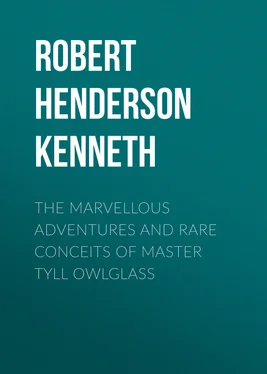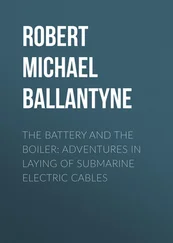Robert Henderson Mackenzie Kenneth - The Marvellous Adventures and Rare Conceits of Master Tyll Owlglass
Здесь есть возможность читать онлайн «Robert Henderson Mackenzie Kenneth - The Marvellous Adventures and Rare Conceits of Master Tyll Owlglass» — ознакомительный отрывок электронной книги совершенно бесплатно, а после прочтения отрывка купить полную версию. В некоторых случаях можно слушать аудио, скачать через торрент в формате fb2 и присутствует краткое содержание. Жанр: foreign_prose, foreign_antique, на английском языке. Описание произведения, (предисловие) а так же отзывы посетителей доступны на портале библиотеки ЛибКат.
- Название:The Marvellous Adventures and Rare Conceits of Master Tyll Owlglass
- Автор:
- Жанр:
- Год:неизвестен
- ISBN:нет данных
- Рейтинг книги:5 / 5. Голосов: 1
-
Избранное:Добавить в избранное
- Отзывы:
-
Ваша оценка:
- 100
- 1
- 2
- 3
- 4
- 5
The Marvellous Adventures and Rare Conceits of Master Tyll Owlglass: краткое содержание, описание и аннотация
Предлагаем к чтению аннотацию, описание, краткое содержание или предисловие (зависит от того, что написал сам автор книги «The Marvellous Adventures and Rare Conceits of Master Tyll Owlglass»). Если вы не нашли необходимую информацию о книге — напишите в комментариях, мы постараемся отыскать её.
The Marvellous Adventures and Rare Conceits of Master Tyll Owlglass — читать онлайн ознакомительный отрывок
Ниже представлен текст книги, разбитый по страницам. Система сохранения места последней прочитанной страницы, позволяет с удобством читать онлайн бесплатно книгу «The Marvellous Adventures and Rare Conceits of Master Tyll Owlglass», без необходимости каждый раз заново искать на чём Вы остановились. Поставьте закладку, и сможете в любой момент перейти на страницу, на которой закончили чтение.
Интервал:
Закладка:
But the count was greatly content with his prowess, and with him brought back from the field of battle a goodly heap of pork, the which did they thereafter cut up, and some roasted they and other did they boil. And Owlglass would most willingly have had thereof as he sat on his tower. Then did he begin to plan how that he might get thereof, and he did watch when that it should be dinner time. And when that it had become dinner time, he began to blow his horn, and to cry with a loud voice: “The foe cometh! The foe cometh!” Then the count gat him up with his arms, and put on his harness, and took his weapons, and departed quickly forth from the castle into the field. Thereat rejoiced our noble Master Owlglass, and quickly did he get him down from the tower, and came unto the count’s table, and took therefrom boiled and roast, in the which delighted he, and he returned back on his steps, and gat him to the tower. And, when that the horsemen and foot folk came again unto the castle, and of enemies had found not a hair, then murmured they one to the other, saying: “This hath the watchman done to mock us with great scorn and knavery.” And the count cried aloud unto Owlglass, and said unto him: “Wherefore hast thou become foolish and mad?” And Owlglass said: “If that hunger and thirst drive mad, then do I not marvel at my madness.” Thereat said the count: “Why didst thou blow on thy horn for enemies, and there were none?” Then spake Owlglass, and made answer unto the count, saying: “Whereas it fortuned that no enemies were present, I thought in my mind that it would be well to blow on my horn, for that they might come.” Then said the count unto him: “Thou goest about to deceive us with knavish beguiling. When that the enemy cometh, thou wilt not blow; yet when no enemy is nigh at hand, then blowest thou. Of a truth, it is a matter of treachery.” Therewith relieved he Owlglass of lying in the tower, and appointed thereunto another watchman.
Then came it to pass, that Owlglass should run with the foot folk to strive in battle with the enemy. And thereat was good Master Owlglass moved to anger, and cast about in his mind to discover how he might be relieved, and obtain other service. And when the count’s folk departed out from the castle to fight with the foe, then was Owlglass always the last man; and when they returned back unto the castle, was he truly likewise the first man to enter therein. Then spake the count unto him, saying: “How shall I understand this thing? Wherefore art thou always last to depart from the castle, and the first to return back again?” And Owlglass answered and said: “Let not thine anger fall upon me, noble lord; for when that thou and all thy people sat and ate and drank, with great feasting, then lay I upon the tower and fasted so that I fainted thereby, and lost much strength. If therefore ye should be minded, that I should be the first in the field to encounter the foe, I pray thee that ye do let me eat now that with strength may I be filled, and then will I do it, and ye shall perceive that I shall be the first against the enemy and the last to depart from him.” “I mark well,” spake the count, “that thou wilt be a long time in doing this thing, and as long as thou didst sit on the tower.” Thereat said Owlglass: “That which belongeth of right unto a man do others take from him most willingly.” And the count said: “Long shalt thou not be my servant,” and therewith gave him leave to depart. And thereat rejoiced Owlglass, for he cared not every day to fight with the enemy.
The Twenty and Third Adventure
Owlglass was one of those men that the fame of his holy doings came unto the ears of many great lords. The princes, also, loved him much, and did give unto him garments, horses, money, and provision. And he came unto the King of Denmark, who said unto him, that he should do for him a wondrous strange thing, having his horse shod with the best shoes that could be found. Then answered Owlglass to the king, and spake unto him and asked him: “If that he should believe him?” And the king answered and said: “Yea, and if he did according unto his word, it should come to pass as he had promised him.” Then Owlglass did ride his horse unto the goldsmith’s house, and there had golden shoes, with nails of silver, struck unto his horse’s feet, and gat him home again unto the king’s presence, and asked him if that he would pay for the shoeing of his horse? The king said: “Yea, that would be right truly;” and said unto his treasurer, and commanded him, that he should pay for the shoeing of the horse of Owlglass. The treasurer thought that it had been done by a blacksmith. And Owlglass led him unto the goldsmith’s house, and the goldsmith demanded of him one hundred golden marks therefor. The treasurer would not pay this; but went and told the king thereof. Then sent the king for Owlglass, and said unto him: “Owlglass, how dear hast thou made this horse shoeing to be? If that all my horses were shod as thou hast had thine, soon should I have to sell my country and my people!” Then Owlglass answered and spake unto him: “My gracious lord and king, thou didst say I should have my horse to be shod with the best shoes, and have I not done according unto thy words, for would ye have better shoeing than silver and gold.” Then said the king: “Thou art my dearest servant, thou dost that I tell thee to do.” And the king laughed at the merry jest, and did pay the hundred marks. Then Owlglass brake off the golden shoes from his horse’s feet, and had shoes of iron struck on, and he abode with the king unto the day of his death.
The Twenty and Fourth Adventure
While that the noble Prince Casimir, King of Poland, yet lived, there came unto him at his court, good Master Owlglass. And Casimir (blessed be his memory!) did have two fools there, who, in knavery, could not be overcome. And the king of Poland had heard much said of Owlglass, that, in truth, he was not in any way to be quipped or deceived. Nor did Owlglass agree with the fools of the king, and that beheld the king right soon. Then spake the king unto Owlglass and the two fools, saying: “Behold! unto that one of ye the which can wish the greatest wish will I give a coat and twenty gold pieces thereto, and this shall be within my presence.” Then said the first fool: “I would have that heaven were nothing but paper, and the sea nothing but ink, that therewith might I in figures write down how much money I would have, and that it came unto me.” The second spake, saying: “I would have as many towers and castles as there be stars in heaven, so that therein might I hold all the money that my fellow here would have.” Then was it time that Owlglass should speak, and the king thought that in truth he could not wish anything greater. But Owlglass opened his mouth and spake, saying: “I, in truth, would desire that after ye two have made me your heir, that the king would yet on this day hang ye both.” Thereat laughed the king right merrily, and Owlglass won the coat and the twenty gold pieces, with the which he departed in joy.
The Twenty and Fifth Adventure
On a time it happened that Owlglass thought to go to confession, for his sins were many, and therewith was his soul sore laden, so that he meditated much on the badness of his ways. Then came he to the church, where sate the priest in the confessional, and before him stood a silver box, by which he set great store. Then Owlglass began a long speech, in the which he told the good priest his heavy sins, so great in number; and at last, the saying of Owlglass was so long, that the priest did lean back and slept, for he was weary of the knaveries of Owlglass. Then Owlglass took the box away, and did put it in pouch.
Читать дальшеИнтервал:
Закладка:
Похожие книги на «The Marvellous Adventures and Rare Conceits of Master Tyll Owlglass»
Представляем Вашему вниманию похожие книги на «The Marvellous Adventures and Rare Conceits of Master Tyll Owlglass» списком для выбора. Мы отобрали схожую по названию и смыслу литературу в надежде предоставить читателям больше вариантов отыскать новые, интересные, ещё непрочитанные произведения.
Обсуждение, отзывы о книге «The Marvellous Adventures and Rare Conceits of Master Tyll Owlglass» и просто собственные мнения читателей. Оставьте ваши комментарии, напишите, что Вы думаете о произведении, его смысле или главных героях. Укажите что конкретно понравилось, а что нет, и почему Вы так считаете.












